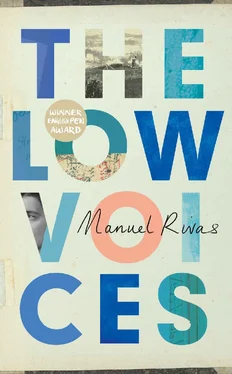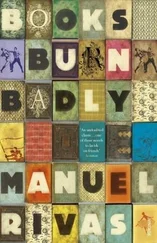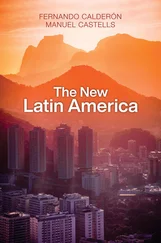Manuel Rivas - The Low Voices
Здесь есть возможность читать онлайн «Manuel Rivas - The Low Voices» весь текст электронной книги совершенно бесплатно (целиком полную версию без сокращений). В некоторых случаях можно слушать аудио, скачать через торрент в формате fb2 и присутствует краткое содержание. Год выпуска: 2016, Издательство: Harvill Secker, Жанр: Современная проза, на английском языке. Описание произведения, (предисловие) а так же отзывы посетителей доступны на портале библиотеки ЛибКат.
- Название:The Low Voices
- Автор:
- Издательство:Harvill Secker
- Жанр:
- Год:2016
- ISBN:нет данных
- Рейтинг книги:5 / 5. Голосов: 1
-
Избранное:Добавить в избранное
- Отзывы:
-
Ваша оценка:
- 100
- 1
- 2
- 3
- 4
- 5
The Low Voices: краткое содержание, описание и аннотация
Предлагаем к чтению аннотацию, описание, краткое содержание или предисловие (зависит от того, что написал сам автор книги «The Low Voices»). Если вы не нашли необходимую информацию о книге — напишите в комментариях, мы постараемся отыскать её.
A brilliant coming-of-age novel from one of Spain’s greatest storytellers,
is a humorous and philosophical take on memory, belonging, and the nature of storytelling itself.
The Low Voices — читать онлайн бесплатно полную книгу (весь текст) целиком
Ниже представлен текст книги, разбитый по страницам. Система сохранения места последней прочитанной страницы, позволяет с удобством читать онлайн бесплатно книгу «The Low Voices», без необходимости каждый раз заново искать на чём Вы остановились. Поставьте закладку, и сможете в любой момент перейти на страницу, на которой закончили чтение.
Интервал:
Закладка:
But that wasn’t the reason he threw us out of the house that night. He was right. He wanted to sleep, and we wouldn’t stop fighting. That terrible bone of contention that can lead you to hate the person you love in a minute, and after that you don’t remember what it was. We were struggling furiously when he got up, took us by the arm, opened the door and landed us beneath the stars, on the edge of that locus horroris , the Priest’s Wood. We were amazed to hear the lock turning behind us. A minute earlier, we had hated each other and been scratching each other’s faces. Now, suddenly, the two enemies were alone in the universe. Expelled from the hearth. And, as is well known, there is no greater fear than the fear of being abandoned.
We were alone in the night, listening to the inner sounds of the house, that solitary house of ours that resisted all tempests. How moved I was by the words Henri Bosco used to describe his home: ‘The house fought bravely.’ The truth is we soon stopped feeling the Hansel and Gretel syndrome. We forgot the cause of our fight. We held hands. We were more united than ever. We swore there would never be another war between us. And the spell worked. From a terrible sense of unease we went to a feeling of calm and then an exciting happiness. If the patriarchal door remained closed, where were we going to seek refuge?
There were our uncles and aunts. It is common these days to talk about the genome. The similarities and differences between humans and closely related animals such as chimpanzees, bonobos and orang-utans. It’s not true that they don’t have language or use tools. As the great Uruguayan Pablo Casacuberta once explained, we’re almost identical in everything. What is the main difference? We humans have uncles and aunties!
And there María and I were, happily going through our wonderful list. A Gaiteira, O Birloque, Anceis, Sada, Sergude, the barber’s shop on Bizkaia Street, the tavern in Almeiras … We even had an uncle in Seville: Benito, a meter reader for an electric company, as it so happened. I was under the impression Uncle Benito had walked from Corpo Santo to Seville as a young man, because I was always hearing about the way he walked. He wandered the streets of Seville on foot, from porch to porch, from meter to meter, and in summer the ground became scorching hot. Especially, one imagines, for an employee of an electric company whose job is to charge for kilowatts. Carmina’s mother would always invite this nice young Galician, so well mannered, with a tenor’s voice, into the courtyard, so he could rest in the shade and drink a lemonade. And that was how Benito and Carmina met and got married. Thanks to electricity. Quite apart from his opinion about companies in the electricity sector, my father, like everybody else, was very fond of Benito.
When he was much older, my father went to take the exam for his certificate of primary education. He studied a lot, with my sister Sabela. He did everything well, but when they asked him the names of some parasites, he fell silent. He didn’t want to say what he was really thinking. At the examiner’s insistence, he gave the name of a parasite that had nothing to do with capitalism or politics: a tortoise. He was very pleased with himself for including this touch of irony. The examiner liked it as well. His next task was to write an essay.
The theme? ‘My Holidays’.
My father put down his pen, stood up from the table and headed for the exit. The teacher called after him and asked for an explanation. Why leave now? He replied, ‘I cannot write about something I do not know.’ She kindly insisted, ‘Please sit down. You may write about anything you like.’ So my father wrote about Uncle Benito’s adventure, the legend that he’d gone walking from Corpo Santo to Triana Bridge. He described this enchanting city where meter readers met luminous women in courtyards in the shade. They could even get married and be peacefully happy. And he added, ‘I really liked Seville, I really did.’ But he never went there. He didn’t like long journeys. He liked travelling less and less. During his final years working, he would get up very early, two or three hours before he had to, and drive the Renault 4 or ‘Cuatro Latas’ very slowly, to avoid unfriendly traffic.
We had lots of places to go. Uncles and aunts formed a republic, in every sense of the word. There was Pepa in A Gaiteira, who’d always been a keeper of harmony. In O Birloque, Felicitas, but also Aunt Amparo with her sewing workshop. I loved going there. I have always felt well in hairdressing salons and sewing workshops. Half a dozen girls worked in Amparo’s workshop and would laugh and gossip in time to the pedals of the sewing machines. Suddenly, the machines remained in suspense. The voice of Juana Ginzo or Matilde Conesa in the radio dramas of Guillermo Sautier Casaseca. That was how to reach the hearts of people. You had the right to stop your Singer out of emotion! A man, a little man, felt like a dandy in that place. Some of those girls must have been reading Corín Tellado. The equivalent for men was western novels. On this issue, I still had a few inches to grow. I was immersed in the comic books Capitán Trueno and El Jabato . The thing that would change everything, when I had my tonsils taken out, was reading The Last of the Mohicans in an illustrated edition by Bruguera. I now had my own hero, Uncas, with his turtle tattoo. A few inches later, the summer before starting at secondary, I took an overdose of the Far West. A kind of training. My friend from Castro, Manolo de Hilario, was a good supplier. And had good taste. He’s still a great reader of the best literature. And a specialist in the installation of large cranes. Cranes, like ships, are the most fascinating human architecture. Railways as well. There we were, heading for the Far West. I trust his sense of smell, which had its beginnings in those discoveries he made when we were children. Most of the novels bore the signature of Marcial Lafuente Estefanía, but he would recommend other authors such as Keith Luger and Silver Kane. The style was different. Today, from time to time, there are still very serious fights between very serious writers on the subject of whether style exists or not, and what it is. I think these debates take place between people who have never read western novels with the necessary suspension of disbelief. On the hottest days in summer, when the hours were dozing in the shade, Manolo de Hilario and I were capable of reading five novels on the trot, and I swear the style — the aura even — was perfectly visible. The faces sent back reflections like a mirror. There was, for example, Silver Kane’s smile. The oblique line of irony on his mouth. The electricity of erotic tension in his blazing eyes. Yes, the way Far West heterodoxy talked, when it achieved that mixture of sarcasm and irony, was something we felt very close. One of our local heroes was Juan Juanilla, the son of Corazón, an emigrant in Germany, who came back from the cold dressed as a card player on a Mississippi paddle steamer. He had that style. There were people who travelled long distances to watch him play tute in the bar. Not just because of his skill with the cards. For every trick, the right sentence. The fist banging down on the table. Here it comes: ‘Ever since the invention of gunpowder, men have been finished!’
It was said people didn’t even read one book per year, but the fact is they never took the chapbook into account. The one that sold for five pesetas and could even be rented from the kiosk. The girls had Corín Tellado. The truth is they read more than us. They were more avant-garde. In the hairdressing salons, there were gossip magazines and photo-novels. In the sewing workshops, the fashion magazines were a joy to the eyes and the imagination in those sombre times. The models, who looked like aliens with their daring hairstyles and clothes, were the topic of conversation and much laughter. But they also somehow forced people to express an opinion. Liberality was measured in centimetres. In little time, less than you might think, a girl would appear with the same hairstyle, the same clothes. On her own, walking down the road from Elviña to Castro, she could alter reality. Western novels could be read at any age. Years later, in the 1990s, I came across Silver Kane again. We were on the Irish Sea, having reached the 54th parallel, in the region of Black Rock, and he was being read in their bunks by iron sailors, real cowboys on that unceasing, indomitable frontier. Tied in so they wouldn’t be knocked about by the waves, they read with an expression that was familiar to me. The oblique smile. Somebody reading out what the rich heiress of a ranch says to the guy who resists her: ‘Listen, cowboy, I’m looking for a real man. Have you seen one anywhere?’ Listen. The sailor reads aloud. It’s Boquete from Catoira who replies off the cuff, like a classic, ‘There was one, girl; with you, that makes two of us.’
Читать дальшеИнтервал:
Закладка:
Похожие книги на «The Low Voices»
Представляем Вашему вниманию похожие книги на «The Low Voices» списком для выбора. Мы отобрали схожую по названию и смыслу литературу в надежде предоставить читателям больше вариантов отыскать новые, интересные, ещё непрочитанные произведения.
Обсуждение, отзывы о книге «The Low Voices» и просто собственные мнения читателей. Оставьте ваши комментарии, напишите, что Вы думаете о произведении, его смысле или главных героях. Укажите что конкретно понравилось, а что нет, и почему Вы так считаете.












